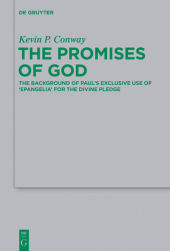 Neuerscheinungen 2014Stand: 2020-02-01 |
Schnellsuche
ISBN/Stichwort/Autor
|
Herderstraße 10
10625 Berlin
Tel.: 030 315 714 16
Fax 030 315 714 14
info@buchspektrum.de |

Kevin P. Conway
The Promises of God
The Background of Paul´s Exclusive Use of ´epangelia´ for the Divine Pledge
2014. XVIII, 297 S. 230 mm
Verlag/Jahr: DE GRUYTER 2014
ISBN: 3-11-037507-9 (3110375079)
Neue ISBN: 978-3-11-037507-7 (9783110375077)
Preis und Lieferzeit: Bitte klicken
Die Reihe Beihefte zur Zeitschrift für die neutestamentliche Wissenschaft (BZNW) ist eine der renommiertesten internationalen Buchreihen zur neutestamentlichen Wissenschaft. Seit 1923 publiziert sie wegweisende Forschungsarbeiten zum frühen Christentum und angrenzenden Themengebieten. Die Reihe ist historisch-kritisch verankert und steht neuen methodischen Ansätzen, die unser Verständnis des Neuen Testaments befördern, gleichfalls offen gegenüber.
The series Beihefte zur Zeitschrift für die neutestamentliche Wissenschaft (BZNW) is one of the oldest and most highly regarded international scholarly book series in the field of New Testament studies. Since 1923 it has been a forum for seminal works focusing on Early Christianity and related fields. The series is grounded in a historical-critical approach and also explores new methodological approaches that advance our understanding of the New Testament and its world.
This study is the first to investigate why Paul makes exclusive use of ´epangelia´ for the divine pledge when referring to the Abrahamic covenant, a usage of the term never found in the OT-LXX. After examining Jewish writings and Greek literature of the classical and Hellenistic periods, this study demonstrates that Paul is rather unique in his exclusive use of the ´epangelia´ word group for the divine pledge and for using the term predominantly in reference to the Abrahamic promises. This exclusive usage is further deemed unexpected in that the´horkos´ and ´omnymi´ lexemes are by far the terms most commonly associated with God´s promises to Abraham in the OT, the literature with which Paul was most familiar. The study then moves to explain why Paul has chosen this path of discontinuity, where it is argued that Paul´s exclusive choice of ´epangelia´ for the divine promise is driven by its conceptual and linguistic correspondence with the ´euangelion´, one of the terms Paul adopted from the early church that forms the core of his ministry. This conceptual word study of the divine promise will benefit Pauline scholars interested in Paul´s use of the OT as well as his association of the ´euangelion´ and ´epangelia´ word groups.
Kevin P. Conway,Institute for Biblical & Theological Studies, Budapest, Hungary.


